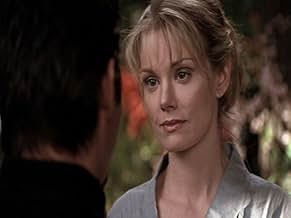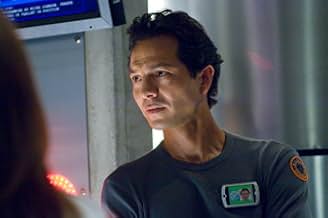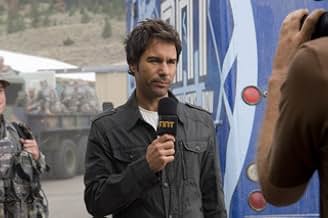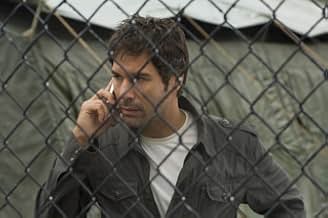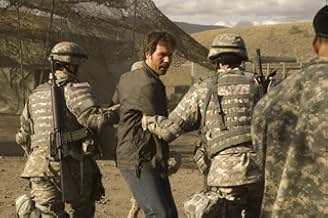Uma equipe de cientistas do governo é prontamente reunida para investigar um misterioso contágio de codinome Andrômeda. Enquanto isso, um jornalista investigativo é informado sobre o inciden... Ler tudoUma equipe de cientistas do governo é prontamente reunida para investigar um misterioso contágio de codinome Andrômeda. Enquanto isso, um jornalista investigativo é informado sobre o incidente.Uma equipe de cientistas do governo é prontamente reunida para investigar um misterioso contágio de codinome Andrômeda. Enquanto isso, um jornalista investigativo é informado sobre o incidente.
- Indicado para 7 Primetime Emmys
- 22 indicações no total
Explorar episódios
Avaliações em destaque
This starts off well, and if you're hoping for Crichton's complex/tense gem of a novel you'll soon be disappointed. They throw every sci fi cliché into this one. The evil govt. conspiracy (to get the master weapon); the plucky reporter; a nuke; a master monster; plenty of sci fi babble; and in the end a 10-9-8 countdown-will our hero be able to save himself and his team-followed by a "it's not over yet" fade out. Just when you think they've run out of clichés they pull another one out and throw it at you.
Ridley Scott you should be ashamed of yourself!This blots your copy book big time! LUDICROUS!!!! For teens only; they'll think it's cool!
Ridley Scott you should be ashamed of yourself!This blots your copy book big time! LUDICROUS!!!! For teens only; they'll think it's cool!
Save yourself a few tedious hours, skip this crap and see the 1971 original. This is another example of a movie that has nothing going for it but the good feelings a viewer might have about the original. (How appropriate that I first saw a commercial for it while waiting for the lousy "Indiana Jones 4" to begin.)
So, so, so much padding! (And even so, A&E managed to stuff in almost 80 minutes of commercials in the two night run.) Ridiculous plot lines that go nowhere (the Geraldo-style reporter, "vent-mining"), unnecessary time-waster shots of animals eating each other (all just to establish the infection vector of a rat dropped onto a group of National Guardsmen) family squabbles that go nowhere... all of these had the unmistakable feel of an effort to reach a predetermined running time. The problem is, when length is more important a goal than quality, nothing can be left on the cutting-room floor. Trimmed to two hours, this just might have been a watchable movie.
Even if decently edited to tighten up the pacing, there's then the problem of reeediculous plot devices that were added to this adaptation. For example:
Michael Crichton wrote the original novel of "The Andromeda Strain", and the 1971 movie remembered so fondly by many was a quite faithful adaptation. You've heard of Michael Crichton because he has written lots of exciting and interesting science fiction, much of which has been turned into movies (of varying quality.)
This adaptation was written by Robert Schenkkan. You likely haven't heard of him, because he's been asked to write almost nothing else for the screen. Judging from this production, there would seem to be a reason for that. He has written a number of well-received plays, but apparently that talent does not translate well to television; what I recall of his 2004 "Spartacus" miniseries was on the level of "Andromeda". (Trekkie alert: as a C-list actor, Schenkkan is best remembered for eating an alien cockroach and then getting his head blown up, when he played Commander Remmick in the ST:TNG first-season episode "Conspiracy".)
If this is the best A&E can do, I hope that in the future they'll just stay out of the science fiction genre. At the very least they should produce original stories, instead of mucking up remakes of perfectly good predecessors.
I'll never get those four hours back, but you still have a chance to miss this movie. Consider yourself warned.
So, so, so much padding! (And even so, A&E managed to stuff in almost 80 minutes of commercials in the two night run.) Ridiculous plot lines that go nowhere (the Geraldo-style reporter, "vent-mining"), unnecessary time-waster shots of animals eating each other (all just to establish the infection vector of a rat dropped onto a group of National Guardsmen) family squabbles that go nowhere... all of these had the unmistakable feel of an effort to reach a predetermined running time. The problem is, when length is more important a goal than quality, nothing can be left on the cutting-room floor. Trimmed to two hours, this just might have been a watchable movie.
Even if decently edited to tighten up the pacing, there's then the problem of reeediculous plot devices that were added to this adaptation. For example:
- Telepathic germs (you gotta be freaking kidding)
- Messages from the future (I wish I was freaking kidding) --- Note to you guys in the future: instead of the cryptic "739528", maybe "hey, look on the space station!" would get your point across a little better
- Orbiting wormholes (still not kidding)
- Blackbird attacks that kill soldiers in helmets and full combat gear (shades of Alfred Hitchcock)
- Endless blather about "vent mining", and even a terrorist attack on a vent mining platform. ----- (Oops! did we forget to explain what that had to do with the story?)
- "Pass the thumb"
- Andromeda racing across the countryside turning everything yellow.
- Dime-store CGI (we're talking "Sci-Fi Channel Original" quality) used even in scenes where the real thing would have been easier and more effective: flame throwers, dried blood sifting from a cut, the inexplicable falling debris in the core.
- Is the action dragging? Time for some Guardsmen to buy the farm!
- Hollywood leftist paranoia: the evil team of General Mancheck and Colonel Farris, military hit men, NSA stashing a final vial of the pathogen, and (my personal favorite) the company Enburton (Enron + Halliburton?) running the vent mining operation.
Michael Crichton wrote the original novel of "The Andromeda Strain", and the 1971 movie remembered so fondly by many was a quite faithful adaptation. You've heard of Michael Crichton because he has written lots of exciting and interesting science fiction, much of which has been turned into movies (of varying quality.)
This adaptation was written by Robert Schenkkan. You likely haven't heard of him, because he's been asked to write almost nothing else for the screen. Judging from this production, there would seem to be a reason for that. He has written a number of well-received plays, but apparently that talent does not translate well to television; what I recall of his 2004 "Spartacus" miniseries was on the level of "Andromeda". (Trekkie alert: as a C-list actor, Schenkkan is best remembered for eating an alien cockroach and then getting his head blown up, when he played Commander Remmick in the ST:TNG first-season episode "Conspiracy".)
If this is the best A&E can do, I hope that in the future they'll just stay out of the science fiction genre. At the very least they should produce original stories, instead of mucking up remakes of perfectly good predecessors.
I'll never get those four hours back, but you still have a chance to miss this movie. Consider yourself warned.
During the late sixties, Michael Crichton wrote a novel about contamination with an alien microorganism. At that time, science was hailed as the pinnacle of human achievement and it was thought that anything is possible. Therefore it is normal for the book and the subsequent film from 1971 to focus on the science, on the formalism, on the way people think their way out of a situation.
Fast forward to 2008. People are dumber, science is a joke, people need to look good and the design must be perfect. Some horrible deaths and some fear of government conspiracy or terrorism is the only way tension can be achieved.
The problem is that I have anticipated this. My own theory says that if you expect it to happen, there won't be a negative response, yet I am terribly angry at this mini series BECAUSE it was exactly what I expected. Things have been added to the original story that make no sense and make no sense to add: government black ops, wormholes, message from the future, ecological controversy over ocean vent mining, etc, etc. As expected the effects were really good, the people looked good, the computer interface design was flawless. And it all fell completely empty.
If you are familiar to The Andromeda Strain book or 1971 movie, you might find it interesting to see how it can go horribly wrong. Otherwise, just watch the 1971 version. It is slow paced, faithful to the book and a lot more interesting.
Fast forward to 2008. People are dumber, science is a joke, people need to look good and the design must be perfect. Some horrible deaths and some fear of government conspiracy or terrorism is the only way tension can be achieved.
The problem is that I have anticipated this. My own theory says that if you expect it to happen, there won't be a negative response, yet I am terribly angry at this mini series BECAUSE it was exactly what I expected. Things have been added to the original story that make no sense and make no sense to add: government black ops, wormholes, message from the future, ecological controversy over ocean vent mining, etc, etc. As expected the effects were really good, the people looked good, the computer interface design was flawless. And it all fell completely empty.
If you are familiar to The Andromeda Strain book or 1971 movie, you might find it interesting to see how it can go horribly wrong. Otherwise, just watch the 1971 version. It is slow paced, faithful to the book and a lot more interesting.
Having recently re-watched the 1971-version of "The Andromeda Strain" taught me one thing: the original is still a near-perfect Sci-Fi landmark and never will a remake, whether in the form of a film or a mini-series, be any better.
But okay, I'm not here to elaborate on the superiority of the Robert Wise classic. The mini-series has reason to exist as well, although it never really surpasses the quality-level of "average". Literally everything about "The Andromeda Strain" 2008 is average;- whether it comes to the added storylines versus the original film, the acting performances, the action/horror sequences, or the special effects. The foundations of Michael Crichton's genius novel are luckily kept intact, give or take a few minor details. When a satellite crashes back onto earth, almost the entire population of the nearby little town Piedmont, Utah, literally drops dead. In the original film, Piedmont was located in New Mexico, but I guess that's one of the few minor details. A handful of eminent scientists are escorted from all corners of the US of A to a top-secret governmental underground facility in the desert to examine the unearthly substance attached to the satellite. What's different or additional compared to the '71 version is that there's a sub-plot with a research journalist, bigger political involvement (including a role for the US-President), nastier intentions by the military and a couple of utterly grotesque theories with wormholes.
People like Benjamin Bratt and Christa Miller are decent performers, but they fail to be very plausible as brilliant scientists. Still, they are not as implausible as - say - the numerous mutations of the virus, or the insane explanations of where it supposedly comes from. The mini-series was released in the same year as the original author, the mighty Michael Crichton, passed away. I sincerely hope this wasn't the last adaptation of his work that he had to see.
But okay, I'm not here to elaborate on the superiority of the Robert Wise classic. The mini-series has reason to exist as well, although it never really surpasses the quality-level of "average". Literally everything about "The Andromeda Strain" 2008 is average;- whether it comes to the added storylines versus the original film, the acting performances, the action/horror sequences, or the special effects. The foundations of Michael Crichton's genius novel are luckily kept intact, give or take a few minor details. When a satellite crashes back onto earth, almost the entire population of the nearby little town Piedmont, Utah, literally drops dead. In the original film, Piedmont was located in New Mexico, but I guess that's one of the few minor details. A handful of eminent scientists are escorted from all corners of the US of A to a top-secret governmental underground facility in the desert to examine the unearthly substance attached to the satellite. What's different or additional compared to the '71 version is that there's a sub-plot with a research journalist, bigger political involvement (including a role for the US-President), nastier intentions by the military and a couple of utterly grotesque theories with wormholes.
People like Benjamin Bratt and Christa Miller are decent performers, but they fail to be very plausible as brilliant scientists. Still, they are not as implausible as - say - the numerous mutations of the virus, or the insane explanations of where it supposedly comes from. The mini-series was released in the same year as the original author, the mighty Michael Crichton, passed away. I sincerely hope this wasn't the last adaptation of his work that he had to see.
There is a certain type of movie. It's usually a made-for-TV movie, and it's usually an "updated" remake of an older movie.
The cast and story elements are painfully politically correct.
The writers appear to labor under the mistaken assumption that the viewer really doesn't need to be told a coherent story as long as there are a few visual elements from the original and some handsome-looking people emoting at each other. And things blowing up.
If there was a punchline to the original, the film will either ignore, misinterpret, or completely blow it.
The remake of Lathe of Heaven (2002)was such a film.
The remake of The Andromeda Strain (2008) is also such a film. It takes the tight script and edge-of-seat stress and paranoia of the original and substitutes digital effects, things blowing up, and absolutely nonsensical plot. When the time comes for the big reveal (which I won't reveal here), instead of the insightful political message of the original, we get a sophomoric, pasted-on ending that doesn't relate to what's gone before and basically contains no message whatsoever, but does allow one last digital effect.
It's not even bad enough to be good in a campy way. It's just dreary and indecipherable. See the original instead.
The cast and story elements are painfully politically correct.
The writers appear to labor under the mistaken assumption that the viewer really doesn't need to be told a coherent story as long as there are a few visual elements from the original and some handsome-looking people emoting at each other. And things blowing up.
If there was a punchline to the original, the film will either ignore, misinterpret, or completely blow it.
The remake of Lathe of Heaven (2002)was such a film.
The remake of The Andromeda Strain (2008) is also such a film. It takes the tight script and edge-of-seat stress and paranoia of the original and substitutes digital effects, things blowing up, and absolutely nonsensical plot. When the time comes for the big reveal (which I won't reveal here), instead of the insightful political message of the original, we get a sophomoric, pasted-on ending that doesn't relate to what's gone before and basically contains no message whatsoever, but does allow one last digital effect.
It's not even bad enough to be good in a campy way. It's just dreary and indecipherable. See the original instead.
Você sabia?
- CuriosidadesOriginally aired as a two-part miniseries, but has also been edited into 4 different parts intended for airing as hour long episodes with commercials.
- Erros de gravaçãoWhen the helicopter with the scientists goes to the secret base, it is visible through the helicopter windows that one of the F-16s escorts them. This is impossible, because the F16 has a stall speed of about 250 mph while that helicopter has a max. speed of only 135mph - a difference greater than 100 mph.
- Citações
Dr. Jeremy Stone: So, you're saying they survived Andromeda because they had the same level of stomach acid? That's brilliant.
- ConexõesFeatured in The 60th Primetime Emmy Awards (2008)
Principais escolhas
Faça login para avaliar e ver a lista de recomendações personalizadas
Detalhes
- Data de lançamento
- País de origem
- Central de atendimento oficial
- Idioma
- Também conhecido como
- The Andromeda Strain
- Locações de filme
- Empresas de produção
- Consulte mais créditos da empresa na IMDbPro
- Tempo de duração44 minutos
- Cor
- Mixagem de som
- Proporção
- 1.78 : 1
Contribua para esta página
Sugerir uma alteração ou adicionar conteúdo ausente

Principal brecha
What was the official certification given to O Enigma de Andrômeda (2008) in France?
Responda

